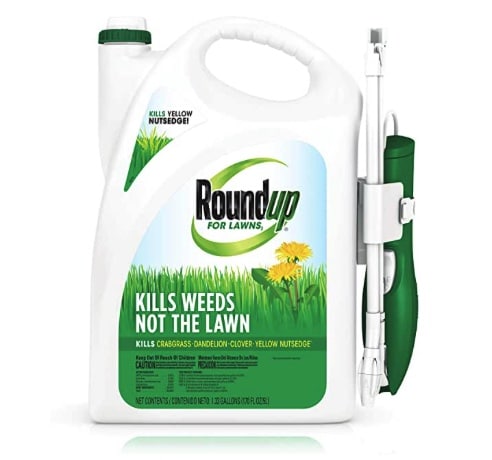t is very important to know how to dispose of Roundup safely. Roundup is one of the most commonly used herbicides globally, and it is available in several different forms. It can be purchased as an aerosol or in a concentrated liquid that must be diluted with water before use. Roundup is sold commercially under several trade names and should be correctly disposed of as it can affect humans, the environment, and some say it can even cause cancer. Here are some tips for safe roundup disposal.
Why is roundup dangerous?

Roundup is dangerous because it contains glyphosate, which is a herbicide that in large doses can affect the soil and, if it accumulates in an area, will affect plants for years to come. Although it is a herbicide that’s used to kill broadleaf weeds, it can also kill other plants that it comes into contact with.
Roundup can cause damage to humans as it’s toxic and many people have become worried recently that roundup may cause cancer. Symptoms of Roundup poisoning are headaches, nausea, fatigue, runny nose, burning or watering eyes, and skin irritation. More severe symptoms include damage to the liver and kidneys, respiratory problems, loss of muscle coordination, and destruction of red blood cells.
Roundup is also bad for the environment because it kills vegetation that is necessary for animal habitats. It can also get into the waterways and affect fish and other animals.
Roundup disposal tips
Roundup is used to get rid of weeds, especially on farms and in lawns. It can also be purchased for use around your yard or commercial property. Some people may have leftover Roundup from when they used it previously to get rid of weeds, but what happens to old containers of Roundup? Even if they are empty, they still have chemicals in them that can be harmful to people who might come into contact with the container.
The best way to dispose of Roundup depends on how much you have and whether or not the containers are labeled as hazardous waste. It’s worth checking with your local water treatment facility to ensure your method will not damage the environment.
Don’t put roundup into a drain; flush it down the toilet, dump it into a drain in the street or pour it into the trash. Instead, take steps to dispose of this harmful chemical safely.
If you have any chemicals, including roundup, that you need to safely dispose of, always read the manufacturer’s instructions on the label. Most products have specific disposal instructions. Here’s how to dispose of roundup safely:
Take it to a hazardous waste collection center
If you have any Roundup leftover in a can or container that is not in good condition, it should be disposed of properly by taking it to your local recycling facility or hazardous waste collection center. According to the Environmental Protection Agency (EPA), this is the safest way to dispose of round up.
Use cat litter to thicken
One way to dispose of Roundup is by mixing it with cat litter. This will help thicken the Roundup so it can be disposed of safely. This method is quite effective for the disposal of Roundup but should be used with caution if you have small children or pets because they could accidentally come in contact with the mixture.
Packing peanuts
Packaging peanuts are another effective way to get rid of Roundup safely. Buying peanuts in bulk from a moving supply company is the cheapest way to soak up and get rid of roundup.
When using either of the above methods to soak up and thicken round up, you should then dispose of the mixture safely, don’t just put it in your trash can. Instead, contact your local health department, state environmental agency, or waste management service for instructions on how to dispose of roundup.
Conclusion
It’s important to know how to properly dispose of Roundup because it is a dangerous herbicide that can cause serious harm if not disposed of properly. Always take steps to protect the environment and keep yourself and your family safe. Dispose of roundup in a way that won’t affect others if they come into contact with the chemical.
Related: Crossbow vs. Roundup
